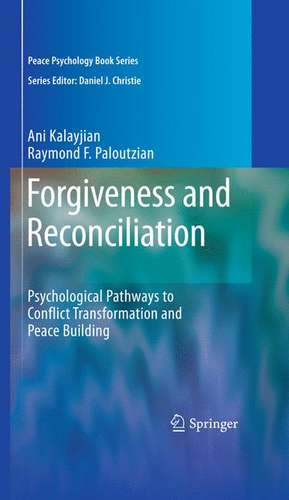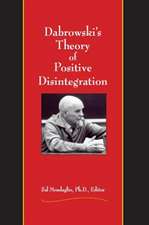Forgiveness and Reconciliation: Psychological Pathways to Conflict Transformation and Peace Building: Peace Psychology Book Series
Autor Ani Kalayjian, Raymond F. Paloutzianen Limba Engleză Paperback – 23 iun 2010
| Toate formatele și edițiile | Preț | Express |
|---|---|---|
| Paperback (1) | 365.05 lei 38-44 zile | |
| Springer – 23 iun 2010 | 365.05 lei 38-44 zile | |
| Hardback (1) | 651.51 lei 43-57 zile | |
| Springer – 24 aug 2009 | 651.51 lei 43-57 zile |
Din seria Peace Psychology Book Series
- 18%
 Preț: 779.26 lei
Preț: 779.26 lei -
 Preț: 361.05 lei
Preț: 361.05 lei - 15%
 Preț: 639.25 lei
Preț: 639.25 lei - 18%
 Preț: 788.54 lei
Preț: 788.54 lei - 15%
 Preț: 699.28 lei
Preț: 699.28 lei - 15%
 Preț: 646.62 lei
Preț: 646.62 lei - 18%
 Preț: 1690.13 lei
Preț: 1690.13 lei - 15%
 Preț: 645.28 lei
Preț: 645.28 lei - 24%
 Preț: 1044.84 lei
Preț: 1044.84 lei - 18%
 Preț: 945.14 lei
Preț: 945.14 lei - 15%
 Preț: 649.54 lei
Preț: 649.54 lei -
 Preț: 386.39 lei
Preț: 386.39 lei - 15%
 Preț: 697.82 lei
Preț: 697.82 lei - 15%
 Preț: 591.14 lei
Preț: 591.14 lei - 18%
 Preț: 1222.94 lei
Preț: 1222.94 lei - 15%
 Preț: 644.82 lei
Preț: 644.82 lei - 15%
 Preț: 649.22 lei
Preț: 649.22 lei - 15%
 Preț: 697.65 lei
Preț: 697.65 lei -
 Preț: 388.72 lei
Preț: 388.72 lei - 15%
 Preț: 647.08 lei
Preț: 647.08 lei - 24%
 Preț: 967.02 lei
Preț: 967.02 lei - 15%
 Preț: 638.89 lei
Preț: 638.89 lei - 15%
 Preț: 650.37 lei
Preț: 650.37 lei - 18%
 Preț: 733.15 lei
Preț: 733.15 lei -
 Preț: 398.74 lei
Preț: 398.74 lei - 15%
 Preț: 644.30 lei
Preț: 644.30 lei - 18%
 Preț: 1116.57 lei
Preț: 1116.57 lei - 15%
 Preț: 643.99 lei
Preț: 643.99 lei - 18%
 Preț: 1116.26 lei
Preț: 1116.26 lei - 18%
 Preț: 1381.26 lei
Preț: 1381.26 lei - 18%
 Preț: 1595.75 lei
Preț: 1595.75 lei - 18%
 Preț: 779.89 lei
Preț: 779.89 lei
Preț: 365.05 lei
Nou
Puncte Express: 548
Preț estimativ în valută:
69.85€ • 73.13$ • 57.80£
69.85€ • 73.13$ • 57.80£
Carte tipărită la comandă
Livrare economică 02-08 aprilie
Preluare comenzi: 021 569.72.76
Specificații
ISBN-13: 9781441962195
ISBN-10: 1441962190
Pagini: 306
Ilustrații: XXII, 306 p.
Dimensiuni: 148 x 210 x 25 mm
Greutate: 0.48 kg
Ediția:2010
Editura: Springer
Colecția Springer
Seria Peace Psychology Book Series
Locul publicării:New York, NY, United States
ISBN-10: 1441962190
Pagini: 306
Ilustrații: XXII, 306 p.
Dimensiuni: 148 x 210 x 25 mm
Greutate: 0.48 kg
Ediția:2010
Editura: Springer
Colecția Springer
Seria Peace Psychology Book Series
Locul publicării:New York, NY, United States
Public țintă
ResearchCuprins
Theoretical Perspectives.- Introduction: Issues and Themes in Forgiveness and Reconciliation.- A Systemic Framework for Forgiveness, Reconciliation, and Peace: Interconnecting Psychological and Social Processes.- Forgiveness and Relational Ethics: The Perspective of the Contextual Therapist.- The Psychology of Forgiveness in the World Religions.- The Bullet and Its Meaning: Forgiveness, Nonforgiveness, and Their Confrontation.- Individual and Interpersonal Levels.- Forgiveness and Reconciliation: Essential to Sustaining Human Development.- Art and Meaning: ARTiculation© as a Modality in Processing Forgiveness and Peace Consciousness.- Promoting Forgiveness Through Restorative Conferencing.- Guilt, Responsibility, and Forgiveness: Lessons from Lifers in Prison.- Intergroup, Societal, and International Levels.- A Black Social Psychologist's Perspective on Racial Forgiveness.- Rwanda: Repentance and Forgiveness – Pillars of Genuine Reconciliation.- Darfur: Efforts to Forgive and Reconcile in an Unresolved Conflict.- India and Pakistan on the Brink: Considerations for Truth, Reconciliation, and Forgiveness.- Forgiveness in the Context of the Armenian Experience.- Forgiveness in Spite of Denial, Revisionism, and Injustice.- Reconciliation and Forgiveness in Divided Societies: A Path of Courage, Compassion, and Commitment.- Dialogue, Forgiveness, and Reconciliation.
Recenzii
From the reviews: “This book is full of insights and analyses that help the reader to apply forgiveness and reconciliation to any interpersonal or international conflict. … This is not just another academic book about an obscure topic, namely, psychology and peacebuilding, but a truly useful handbook on getting beyond war and violence. … This fundamentally practical and needed book adds … essential to the literature by defending the value of the harder road.” (Michael Funk Deckard, Metapsychology Online Reviews, Vol. 14 (21), May, 2010)
Notă biografică
Dr. Anie Kalayjian is a professor of psychology at Fordham University. She is also President of the Association for Disaster and Mass Trauma Studies and the Armenian American Society for Studies on Stress and Genocide. Dr. Kalayjian has been involved at the United Nations for the past fifteen years, where she works with several departments focusing on human rights, women, and mental health.
Dr. Raymond F. Paloutzian received his doctoral degree from Claremont Graduate School and has been a professor of experimental and social psychology at Westmont College, Santa Barbara since 1981. He has been a visiting professor teaching psychology of religion at Stanford University and Guest Professor at Katholieke Universiteit Leuven, Belgium. He is a Fellow of the American Psychological Association, the American Psychological Society, and the Western Psychological Association, and has served as President of APA Division 36 (Psychology & Religion). He is currently the editor of The International Journal for the Psychology of Religion.
Dr. Raymond F. Paloutzian received his doctoral degree from Claremont Graduate School and has been a professor of experimental and social psychology at Westmont College, Santa Barbara since 1981. He has been a visiting professor teaching psychology of religion at Stanford University and Guest Professor at Katholieke Universiteit Leuven, Belgium. He is a Fellow of the American Psychological Association, the American Psychological Society, and the Western Psychological Association, and has served as President of APA Division 36 (Psychology & Religion). He is currently the editor of The International Journal for the Psychology of Religion.
Textul de pe ultima copertă
Anger, hatred, resentment, grudges—when the products of conflict smolder for years, decades, or centuries, the idea of peace may seem elusive and unrealistic. At the same time, people and societies need to move beyond these negative traumatic effects so they can heal. Forgiveness and Reconciliation explores in depth two different yet essential components of this peace-building process.
Unlike most books on the subject, which tend to focus on the individual’s development of forgiveness from a single perspective, Forgiveness and Reconciliation reaches across the spectrum of approaches—socio-psychological, biopsychological, therapeutic, developmental, and spiritual among them—to offer examples of intervention at the individual, community, generational, and national levels. This inclusiveness (and a range of real-world illustrations from U.S. race relations to the Armenian genocide) gives readers access to not only the core issues of forgiveness and the dialogic nature of reconciliation, but also the intersecting psychological and social processes involved as they affect all participants in conflict.
Highlights of the coverage:
Unlike most books on the subject, which tend to focus on the individual’s development of forgiveness from a single perspective, Forgiveness and Reconciliation reaches across the spectrum of approaches—socio-psychological, biopsychological, therapeutic, developmental, and spiritual among them—to offer examples of intervention at the individual, community, generational, and national levels. This inclusiveness (and a range of real-world illustrations from U.S. race relations to the Armenian genocide) gives readers access to not only the core issues of forgiveness and the dialogic nature of reconciliation, but also the intersecting psychological and social processes involved as they affect all participants in conflict.
Highlights of the coverage:
- Reconciliation efforts in Rwanda, Darfur, India, and Pakistan.
- Restorative conferencing and its role in fostering forgiveness.
- Lessons in empathy and repentance from lifers in prison.
- Promoting reconciliation through arts and the media.
- The potential for forgiveness despite revisionism, denial, and continued injustice.
- Reconciliation in the divided society.
Caracteristici
Identifies the central issues related with forgiveness and reconciliation Inclusive, multidisciplinary, multi-ethnic, multi-generational and international perspectives and pathways Includes supplementary material: sn.pub/extras














